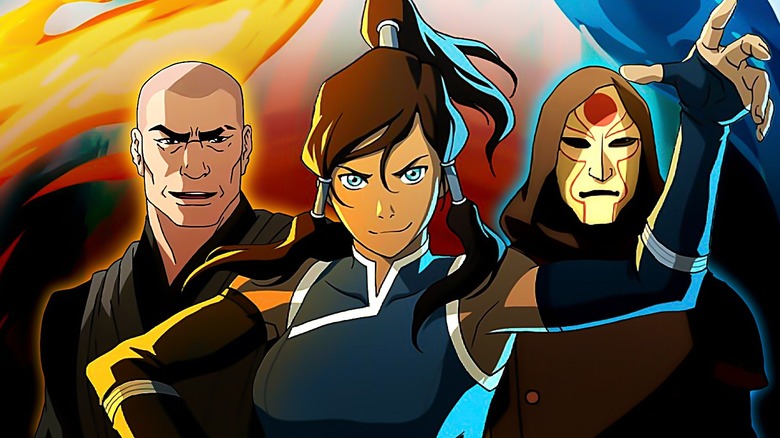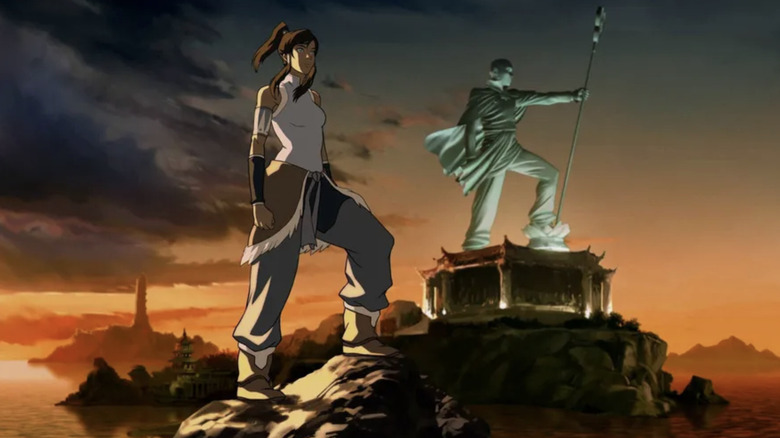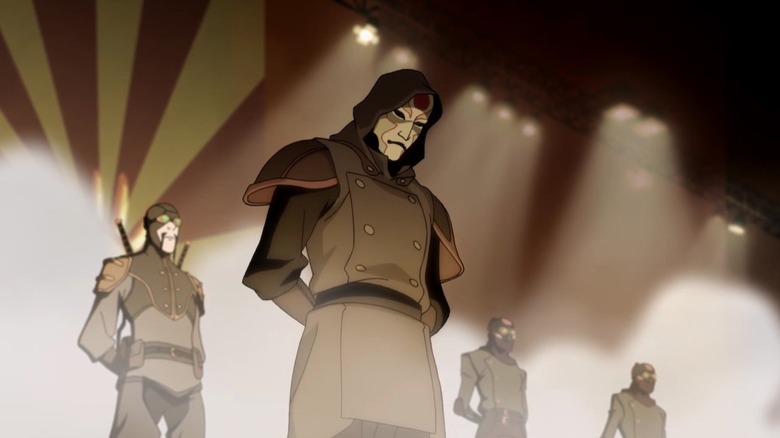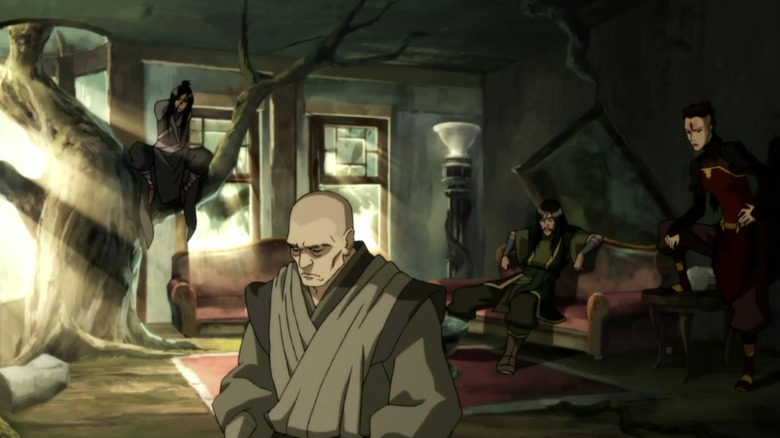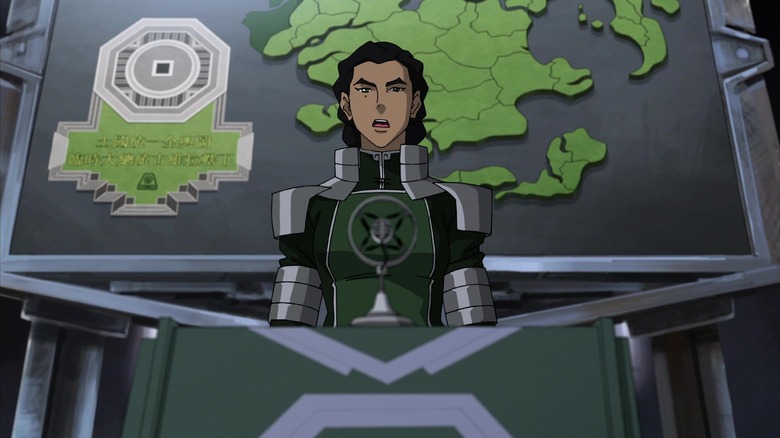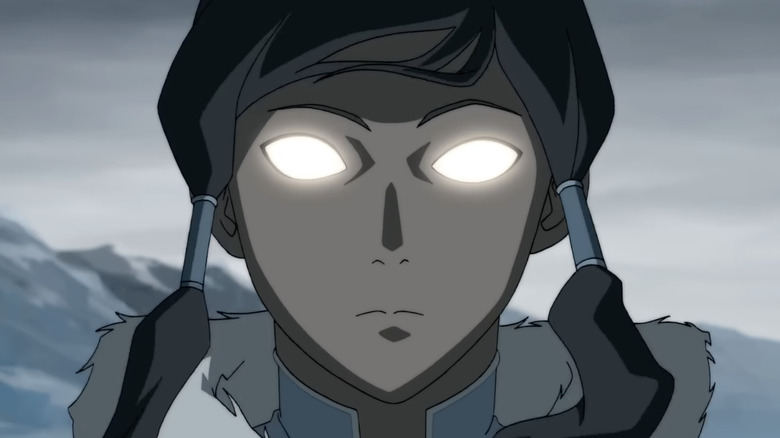10 Years Later, The Legend Of Korra Is A Great Show – But One Part Has Aged Worse Than Ever
We may receive a commission on purchases made from links.
"The Legend of Korra" concluded its fourth and final season 10 years ago today (which is December 19, 2024). It's not as universally loved a series as its predecessor, "Avatar: The Last Airbender," which is often held as a crowning achievement of American children's animation and epic fantasy. With those big shoes, "The Legend of Korra" was never going to completely fill them, but it still has great episodes and many fans — I'm one of them.
The show's greatest legacy is and will probably continue to be how it pushed boundaries for LGBTQ+ representation. Previously, out queer characters were verboten in America children's media, but "Korra" went as far as it could in Book 4, when Korra (Janet Varney) falls in love with her friend Asami Sato (Seychelle Gabriel). The series ends with them holding hands and staring into each other's eyes; you get the feeling that once the camera panned up and they were out of frame, they locked lips.
In general, there was more romance in "Legend of Korra" than there was in "The Last Airbender" (and not always for the best). Unlike Avatar Aang, a 12-year-old child, Korra is a teenager. Part of being at that age is realizing how complex the world can be, hence Korra also faces villains much more layered than the "The Last Airbender" big bad Fire Lord Ozai (Mark Hamill, who first thought the show would never last).
Each of the four "Korra" villains follows a different political ideology:
-
Book 1: The masked Amon leads the Equalists, non-benders who believe that they are oppressed by benders and so want to eradicate the ability.
-
Book 2: Unalaq believes in restoring the spiritual traditions of the Southern Water Tribe and opposes modernity. (This one unfortunately gets flattened into more generic cartoon villainy by the end of the season.)
-
Book 3: Zaheer and his compatriots in the Red Lotus are anarchists who desire "a world without kings and queens, without borders or nations, where Man's only allegiance is to himself and those he loves."
-
Book 4: Kuvira is a fascist who unites the Earth Kingdom under her authoritative rule and seeks to purge the nation of cultural outsiders.
"Legend of Korra" tackling topics like this is usually lauded as a sign of the series' maturity. In a vacuum, it is; generally speaking, these cartoon villains are out for something more complex than just a glowing magic stone. But as someone on the political left, I find myself disagreeing with the show's conclusions. Said conclusions not only lay bear the extent of the creators' biases and knowledge, but they also give away the seemingly simpler era that "The Legend of Korra" was made in.
In Legend of Korra, the answer is always in the political center
"The Legend of Korra" season 4, episode 4, "The Calling," spells out the series' thesis on Avatar Korra and her foils. Aang's old friend Toph bestows wisdom on the young Avatar, telling her to consider the positive qualities of her old foes: Amon fought for equality, Unalaq thought the world had forgotten spirituality, and Zaheer wanted a world of freedom. The problem is, Toph says, that they took these crusades too far. Korra should see the value of these goals and learn to moderate her approach in achieving them. In the series finale, she breaks through to Kuvira by recognizing how similar the two of them are.
The political axis of "The Legend of Korra" falls upon enlightened centrism. Going to the extreme in any political belief or action is an inherent sin, regardless of what those beliefs are.
The Avatar's role in keeping the "balance" of the world begins to make it look like an agent of stagnation who exists to keep the world as it is. "Legend of Korra" deals head on with how industrialization and cultural intermixing from the previously four separate nations disrupts the traditional purpose of the Avatar, but in conclusion makes Korra the guardian against radical political change.
The only upheaval Korra embraces is at the end of Book 2, when she decides to keep the physical and spirit worlds linked together, allowing spirits to pass into the realm of humanity and vice versa. This action and its consequences have no analogue to our reality unlike, say, radical anarchists out to overthrow an oppressive government. It proves easier for the show's creators to imagine (and condone) a world filled with fantasy spirits than one that embraces a different political order than the one followed by modern American hegemony.
Political scientist Francis Fukuyama's 1992 book "The End of History and the Last Man" surveyed the immediate end of the Cold War and concluded there were no more ideological challengers to liberal democratic capitalism. Ergo, that system had won and, moreover, liberalism is the natural endpoint of humanity's ideological struggle, not just another ideology as artificial as any other.
The prosperity and stability of the 1990s didn't do much to challenge Fukuyama's thesis, but the tumultuous 21st century has. "The Legend of Korra" aired from 2012 to 2014, right in the last grasp of this thinking, before the late 2010s and 2020s made it clear we're in the making of a new political order because everyone except those at the very top can't stand the present one.
Amon and the Equalists convey jumbled political messaging
Amon and the Equalists were the first time "The Legend Of Korra" would prove to be dismissive of social movements, and unfortunately set a series trend there.
Due to his revolutionary rhetoric and goal of "equality," Amon is sometimes described as a communist. That too would fit with the setting of "Legend of Korra," a 1920s-esque steampunk world fresh off an industrial revolution; i.e. much like the real world conditions that brought about the development of socialist thought. An industrialized economy mixed with private ownership fuels capitalism, which needs a working class, which in turn creates the idea of transferring power to the hands of that class.
Now, Amon is certainly a populist (also noted by "Avatar" video essayist Hello Future Me) but it's difficult to pin him down as a mirror of any real world political movements, seeing as the goal of the Equalists (the elimination of bending) is innate to the world of "Avatar." As proof of that, some fans have argued Amon is really a fascist — he does lead his followers like a cult and their movement is built on demonizing an "other" (albeit an empowered one).
If the Equalists are meant to be communists, then that exposes either a very childish understanding of communism as just "make everyone the same!" or an imperfect allegory and, thus, solution. Taking one's bending away, as Amon does, is spiritual mutilation, not just redistribution. Bending is part of someone's identity, whereas wealth is a mere accumulation of resources.
These contradictions could be fun to dive into, especially since the Equalists do have valid concerns. Nonbenders are not legally second-class citizens in Republic City, but the benders do have advantages and a hold on power structures. The city's cops and politicians are all benders, as are the skilled laborers; an Earthbender has a leg-up in construction, just as a Firebender who can bend lightning has one as an electrician, etc. A society where some people have magical powers and most don't is a natural recipe for creating a privileged class, so how does one disentangle bending and class besides Amon's incredibly flawed, destructive approach?
"Legend of Korra" Book 1 either doesn't have the answers or doesn't divulge them. This season has the series' weakest political resolution, because in the end, it refuses to make the resolution about the politics. Amon is exposed as a liar (he's really a self-hating Waterbender, using Bloodbending to remove people's bending) and so his followers turn on him. That's it. The Equalists apparently forsake all their beliefs because their leader was a hypocrite, and the inequality of Republic City is not addressed at all in the season's conclusion.
Like Korra herself so often does, "The Legend of Korra" Book 1 bit off more than it could chew.
Zaheer and the Red Lotus are a facile depiction of anarchists
Unlike Amon, Zaheer and the Red Lotus do have a real world ideology. Zaheer (an Air Nomad aspirant who finds himself an Airbender) trains to let go of Earthly attachments, but he's also the "Legend of Korra" villain whose words and actions feel the most tied to our world.
The Red Lotus are simple people who want nothing grand — merely a world of freedom without kings, queens, nations, prisons, or borders. Zaheer and Korra first share a dialogue on this in Book 3's ninth episode, "The Stakeout." He argues removing the divide between nations is merely the next step of Korra's own actions in unifying the physical and spirit worlds, and throws her own experiences with incompetent, corrupt, and dictatorial world leaders back at her.
When Zaheer asks earnestly if the world wouldn't be better off without such leaders, I can only nod my head at the facts he's spitting. But Korra says no instantly, on impulse, and doesn't elaborate beyond "things would be worse" without such leaders. The show believes nation states and unequal power structures are intrinsically good (or at least natural) and not to be questioned, and if you do question them, it's tantamount to delusion.
Then the writing reaches the limits of its understanding, as Zaheer agrees with Korra the world would fall apart without leaders, but that's what he wants. "The only natural order is disorder" — this right here embodies the stereotype that anarchists want to tear down power structures to create chaos, not to replace them with horizontal leadership.
Why is Kuvira shown in a better light than Zaheer?
In the following episode — "Long Live The Queen" — I was outright rooting for Zaheer when he killed the Earth Queen, a horrible tyrant who keeps her people impoverished with high taxes, employs a secret police force who can kidnap citizens (no trial needed), and who feasts on endangered species. Yet Zaheer is the worse of two evils here? The writers think so, because once the Red Lotus announce the Queen's death and tear down the walls separating rich from poor, the city of Ba Sing Se devolves into anarchy in the pejorative meaning of the word. Thomas Hobbes may not exist in the "Avatar" universe but his philosophy — that only the law leashes the beasts inside men — reigns true.
In Zaheer, we have a man who rails against prisons and borders and deposes tyrants. Is it so hard to see why many consider him a hero done dirty by the text? Especially in our current political moment. Mass incarceration has recreated slavery in all but name, and right wing parties across the globe persecute immigrants.
Speaking of, I'm not the first to mention that the villain who "The Legend of Korra" treats most sympathetically is Kuvira — ya know, the fascist one. The one who ruthlessly conquers, sends dissidents to concentration camps, and seeks to purge her Earth Empire of people who have different ethnic descent.
And here's the rub; fascism is really just the next step of capitalism, with the hierarchies taken to another extreme. Benito Mussolini himself called fascism "a merger of state and corporate power," and we're currently seeing how CEOs and aspiring dictators make not-so-strange bedfellows. Evidently, it's easier to accept an extreme version of the current order over an entirely new one, because as Book 1 told us, equality is impossible and undesirable.
10 years after "The Legend of Korra" concluded, global political crises have escalated. Many question if our current institutions have outlasted their usefulness. In "Legend of Korra," if you ask those questions you've immediately set off on the wrong path.
Why The Legend of Korra is still a good show
I admit I've had to wrestle with my thoughts on "Legend of Korra" and it took me a while to get them straightened out. At times I twisted and spun the show's themes in my head, looking for a way I could both enjoy the show and condone its message. Then, I realized I simply didn't have to.
There's a common sentiment these days that you can only like art you agree with politically, or that your favorite art reflects your politics. It's a side effect of how we've all gotten more judgmental, thanks to how so many of us treat the internet like our diaries, and so we know much more about each other than our brains ever evolved to. But, like Zaheer, I've chosen to let go of my Earthly tether; no need to justify my love for "Legend of Korra" when I can just enjoy it, peacefully, in the void.
So yes, flaws and all, I will stand on the hill that "The Legend of Korra" is a good show. I wouldn't use it for a political seminar, but that's not what it's meant to be. It has beautifully animated action, Jeremy Zuckerman's score is magnificent, at the series' best it's a bingeable thrill ride that keeps you wanting more, and Korra herself earns the "legend" description by being a truly great protagonist.
She's a hotheaded teenager but naturally a vulnerable one too, who is only more likable because of her flaws and the dimensionality that they add to her character. Seeing her overcome her depression in season 4 was nearly as satisfying a journey as the scarred prince Zuko's turn from bad to good in the original "Avatar." While I have my issues, the show's political themes of balance do fuse together nicely in Korra's character arc.
I don't agree with everything "The Legend of Korra" has to say, but I can still admire how it says it.
